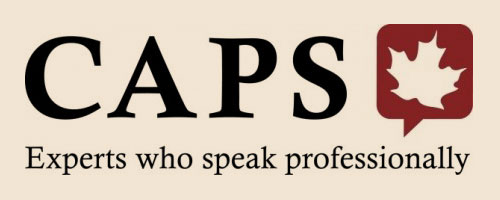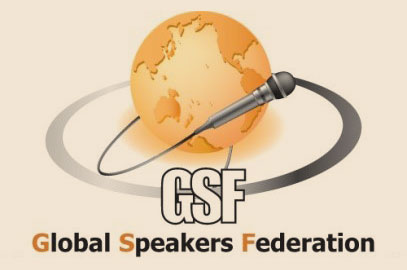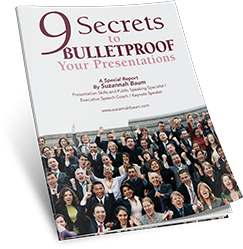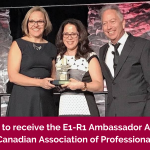Suzannah interviews Ed Tate, the 2000 Toastmasters World Champion of Public Speaking
There I was, just about to take my seat at a 2-day marketing conference. I bumped into a friend, we exchanged our quick updates, and as she was leaving, she said to me, “Oh, did you see? That’s Ed Tate, sitting right behind you.”
Ed Tate? The winner of the Toastmasters World Championship of Public Speaking from 2000?
Yes, that very one.
Well, THAT’S cool.
So as he was taking out all his materials to organize himself for the furious note-taking and learning that the day would bring, I went up to him, introduced myself, and then told him WHY I was introducing myself (in short: because we’re both in the same field, because I’ve known ‘of’ him for many years, both from when I was in Toastmasters AND when I watched his contest-winning speech years earlier, and because I know that he’s well-known in the professional public speaking industry).
He was very kind and gracious, both that day when I approached him, that evening at a meet-and-greet, and then the following day when he agreed to this not-as-short-as-intended interview. It wasn’t my fault that we went a little over time — he really just had a ton of interesting stories, ideas and public speaking tips to share.
In this video, Ed shares his fascinating journey to the Toastmasters stage, including:
- How he beat 30,000 competitors to win this coveted Toastmasters award
- The speaking philosophy that has served him incredibly well over the years
- The biggest mistake that he sees speakers make
- Why speaking is a little like eating mashed green peas.
- And so much more!
(full transcript of video below)
View this interview directly on YouTube.
Enjoyed this interview? Have a question for Ed? Leave a comment below, and let’s continue the conversation!
VIDEO TRANSCRIPT
– Hello and welcome! I’m Suzannah Baum and I have to tell you, I’m so excited about who is sitting next to me right here. I’m at a conference in Ottawa, and as I was walking in the first day, a colleague of mine said, “Oh, there’s my friend Ed Tate.” And I went, “Ed Tate? “The Toastmasters World Champion speaker?” And so I grabbed him and I nabbed him and I said, “Ed would you please, please, “spend a couple moments with me answering some questions?”
– So my right arm is in a cast from her bending it.
– It really is, and I’m so happy and I thank you so much for taking the time just to answer a few questions because I think there are so many people who look at you and see the heights that you can reach in the world of public speaking. But before I do that, I want to introduce Ed properly. You were the 2001 World Champion?
– I’m actually the 2000 World Champion–
– The 2000, okay. So for Toastmasters International, the World Champion of Public Speaking in the year 2000, which is amazing. You went up against approximately 30,000 people.
– Yep.
– And it was whittled down to you on that day on the stage.
– Exactly, like a year-long competition, six different rounds, nine different competitors, and then I took it all. The first champion of the new millennium, century, decade. There’ll never be another one like me for a thousand years.
– There will never be another one. So what I wanted to do was just ask you a little bit about this journey of yours in the world of public speaking. Of course, it was culminated in this massive recognition of Toastmasters, but you have also always had a career in public speaking, so that was one piece of your journey. But just to understand how you got there, what you do now, and how that relates to public speaking, and how do you advise others to reach different goals and pinnacles of public speaking. So just a quick chat about that.
– Okay. So number one, there’s no one way to make it in public speaking. As many speakers as there are, that’s how many different paths there are. So if someone says, this is the way you’re supposed to do it, run from that person because they have no idea what they’re talking about. I didn’t even know this field even existed. I was an executive in the computer industry. My sister had read this book by a lady by the name of Dottie Walters, it was called “Speak and Grow Rich.” And she says I want to get into the speaking business. Now, background about me. In high school, I was a DJ. I would play records for parties and things of that nature. And I looked at her like why only the speakers? Why not complete sound systems? You know, why would you only wanna concentrate on speaking? And she thought it was funny. She told me about the industry, I said give me the book. I read the book and I call up authors. And I’ve had the experience of about 40% of them responding to my emails, my phone calls or messages. So I call up Dottie Walters after I read the book. I talked to my sister on the weekend, finished the book by Wednesday, called their office on a Friday. And they said well, who is this? I’m Ed Tate. You know, who are you? I’m a customer, I’ve got your book, and I’ve got some questions for Dottie. They said well, Dottie happens to be in Denver. I said I’m in Denver! And she’s speaking at the Colorado Free University. By the way, there’s nothing free at the Colorado Free University. It’s just a catalog. Anyway, but I digress. Anyways, so I pay my money, and I race down to the Colorado Free University. And I meet a lady by the name of Ruby Newell-Legner, who later on becomes the President of the National Speakers Association. But Ruby says there’s something I see in you, and she says we’ve got this thing called the Colorado Speaker’s Academy, it’s for aspiring speakers. So what do you think? So I’m a pretty decisive person, I join. So I go from in a week’s time, from not knowing this industry even existed, to being enrolled in a professional speaking program the week later. And then I found out about something called Toastmasters. So I didn’t even know what Toastmasters was. So I remember a friend of mine says, hey, you wanna go to this meeting? It’s called Toastmasters. And I said okay, sure, what’s it about? And she gave me a brief explanation, I really wasn’t paying attention and–
– That’s not good.
– And so I said, what time’s the meeting? She says seven o’clock. I said okay, I’ll pick you up tomorrow night. She says in the morning. I said this group is called Toastmasters, and I’m thinking these people are gonna be drinking in the morning? I’m in! I wanna see this! And I was so disappointed my first meeting. There was no drinking. There was no alcohol. I was disappointed. So but, that meeting, Cherry Creek Toastmasters in Denver, Colorado, it completely changed my life. Not realizing, that it was going to change my life. Because I joined that club and eventually, about 18 months later, I became the World Champion.
– 18 months?
– Yeah.
– Wow. Okay so in that process, what gave you the idea to go for this World Champion spot?
– To be honest with you, Randall Shelton, who’s the founder of Cherry Creek Toastmasters, he kept saying “Hey you’re good enough to “be in the World Championship of Public Speaking.” Now truth of the matter at the time, again I was an executive, I was traveling all the time, I had no time for a contest. So the first year I didn’t even participate whatsoever. But Randall kept harassing me, and we got to that awkward moment, where I was thinking about quitting the club, ’cause I was thinking this guy is constantly hassling over this. So I decide okay, here’s what we’re going to do. Randall here’s the deal. I’m gonna enter this contest. And the moment I lose, we’ll never have this conversation again.
– So basically you did it to get him off your back.
– Exactly.
– Okay.
– And I didn’t lose. And he turned out to be right.
– And so while you were going through this process, did you work with coaches?
– Nope.
– No, you–
– Well I shouldn’t say that. I shouldn’t say that. Initially I did not, I reached out to several other World Champions. Mark Brown was one of them. And they gave me snippets of pieces of advice, but I didn’t work, I didn’t have a coach like I work with people today. For example, Darren Tay is one of my coaching clients, and we work with scripting, and staging, and all this other stuff. And he became the 2016 World Champion of Public Speaking. Aaron Beverly, so another one of my coaching clients, he became the World Champion, but I’m not going to take credit for his accomplishment. Not, and I’m not taking credit for Darren’s accomplishment. Because these people, they worked very very hard for what they did.
– But I gave Aaron advice several years ago. This year, Aaron, and I really admire this, he was in what I call the information collection process. So, he’s getting advice from all World Champions, he was getting, you know, advice from other people. This year, he decided, “You know what? “I’ve collected enough information. “I’m going to do this on my own.” So I know he had another coach, and I, you know, I called him up, “Hey, congratulations “on the work that you did!” He said, “I didn’t do anything.” And then he said, “Well, he must’ve worked with you.” I said, “I didn’t do anything either!” So, the thing I like about that is, there comes a point when people have to have their own voice.
– Mm-hmm.
– They’ve got to stop taking advice from other people, and just come up with their own voice. My championship speech, it was my own voice. I can’t say it was anybody else’s voice. And, in my speaking career, I’ve been in this business 19 years, I started making more money when I had my own voice. When I stopped trying to mimic other people, or model other people. That’s when I started making, like, a lot of money in this industry.
– So, you seem like a pretty confident guy. Would you say that you were, you had this level of confidence when you entered that contest?
– Yes, and the reason for that is because of preparation. Preparation gives you confidence.
– Okay.
– So I had put in a lot of time, a lot of energy, et cetera. So, the real question is not how I got into public speaking, it’s how did I get here in the first place? I’m a stutterer. And there’s no cure for stuttering. And, you know, raise your hands if you know that children can be the cruelest people on Earth. Okay? Anybody here have that experience? And you know, what I did, so my dad was in the military. And we would move to a new neighborhood, and within two to three days, the kids would go, “Ah, we’re gonna make fun of him.” So, we were going to move to the big city. And, we were moving to Chicago, and I was sick and tired of being sick and tired. So I literally prepared for the move. I would read magazines out loud, and practice in front of a mirror. And I did something else, was, I would do play-by-play basketball. So, there would be kids who would be playing basketball outdoors, and I got to the point where I could memorize all their favorite players, and I would do play-by-play. So, I wanted to, when we moved to this new neighborhood, the kids did not know that I suffered from this.
– Mm-hmm.
– And that was my goal, my objective. So I did that successfully. In high school, I was a television anchor within a television studio, I did that for four years. I worked my way through college, I literally paid for my college education as a disc jockey. And then after that, I became an executive in the computer industry. Now, as I look back on it, all those things prepared me for that moment. So that’s my path, and that’s what I meant earlier, about there’s no one path to make it in this business.
– Mm-hmm. So, as you were going through this, what were the most… I mean, and then you started making public speaking, your career formed around giving presentations and training and so on. Was there ever a part where you felt very challenged by it? Or has this always been kind of your happy place?
– Well, this was never a dream for me. To do this. However, I realized I was very very good at it, and… Because I’m an executive, I approached this from a business perspective.
– Mm-hmm.
– And that was, if I could not make money from this, this would be a hobby. I was very very clear about that. Because as an executive, I was very well paid. And my, my first wife, Kathy, she was not thrilled about, you know, me leaving that and, you know, for this risky thing of being like this quote-unquote speaker, which wasn’t that well-defined.
– Right, still isn’t.
– Yeah, and 20 years ago, it was even less defined, if you will. And it seemed, it was like a lot more, it was perceived more of a risk. But I had several different approaches. So, one approach was that, uh, financially, we were in a position that, if I stopped working, I didn’t have to earn income for three years. So I told my wife, you know, “Give me a shot at this. “Let me see if I can do this thing full-time. “This will not disrupt your lifestyle at all.” And I had like a rockstar reputation in the computer industry, so even if after, I said, after one year, if it didn’t work out, then I’ll just go back and be an executive again. And that’s what we did. So, it took longer than a year. Because again, our income was at a certain level, and I told her that I would match that, and I wasn’t even close. So I took another, like, 6 months or so. And then she saw the pathway, and then I haven’t looked back since.
– Okay.
– But, uh, but my mindset was, this is a business first, you get to speak second. If you ever get that order mixed up, you don’t get to speak at all.
– Okay.
– Because a lot of people are like, “This is my passion, this is my joy, “I want to change the world”. No, for me, I’m very very clear, that this was, that this is my profession.
– Mm-hmm.
– And, yes I do want to help the world, and yes I want to change people’s lives, but first and foremost, this is a business. If I can’t, if this business cannot be profitable, then this will be a hobby, it won’t be a business.
– Mm-hmm. Well, I think it’s really the only way to, to make money, and it’s to understand that it’s your expertise, that you need to be good at delivering, and not necessarily with flourish and performance aspects. But really, what value are you giving to your audience, and how adept are you, and your presentation style, in doing that? Which, so, so you brought up something that I… You talked about the passion, people who have a passion for public speaking. And sometimes they’re good at it, and sometimes they’re not, right? They may have a passion, but… Right, it doesn’t mean you should be doing it. So, so what is, in all of your experience, whether it’s from Toastmasters or training or what you’re doing now with training and coaching, and being a rockstar in what you do, what are the biggest mistakes, the most common mistakes that you see speakers, or would-be speakers, making?
– Mm. Well, number one is, like yesterday, we had one of the presenters talk about, people talk about a mess, a moment, or a movement. And, let’s go back to a mess. Maybe they had, like, some type of trauma in their life. So then, one of the biggest mistakes I see people make is, so you’ve had some type of trauma, you’ve had an accident or, it could be even more severe than that. Is getting on the stage too quickly to talk about that. Using the audience as therapy.
– Mm-hmm.
– So that, to me, that’s one of the biggest mistakes that I see.
– Okay.
– The other big mistake, well, the bigger mistake than that is people, when they hop onstage, they’re different from what they are in real life. Because what people want today is authenticity. For example, because of YouTube, you know, or because of Facebook Live, we’re seeing people, you know, they’re speaking into the microphone. So we want the same person who’s off the stage as that is on the stage. Because I can’t tell you, like, one time I was in New Zealand, and I was talking to this guy and he was a very very funny individual, et cetera, and then when he hopped on the stage, I thought it was a scene from Hamlet. You know, “To be or not to be?” Like, who was that guy, you know? Um, so, I think being authentic is… And then, you know, one of my coaches, his name is Alan Weiss, he asks three questions with regard to business: “Why you? Who will pay? And how will you reach them?” These are three questions that need to be answered not just from a speaker’s perspective, but business, period. So why you? Why are you the one? Why are you the expert? Who will pay for this? And how will you reach them? How will you reach that audience? So if you can answer those three questions, you’ve got a business.
– Okay. And now, in terms of confidence, just a couple questions left. In terms of, I want to go back to the confidence piece, I found that, that some people, obviously, they are not feeling confident about public speaking, and they hold themselves back, so they say, “Listen, I don’t enjoy this process “of giving presentations at work, at Toastmasters, “wherever, schools, so I won’t.” But in the process, they may have great skills, but they’re just not stepping up, right? Then we don’t know, because they’re holding themselves back.
– Mm-hmm.
– So, how would you, what kind of advice would you give to those people who say, “Well, listen, I’m not going to, “I try not to do too much public speaking, I don’t like it.”
– Mm-hmm.
– When in reality, they could be good, but we’ll never know, right?
– Well, um, I’m married again, and uh–
– Congratulations.
– My wife and I, we have a 7-month-old. And one of the things that we’re trying to, feed our 7-month-old is solid foods. And, the baby all of a sudden, she has this thing, she doesn’t like something, she’ll just spit it out, it’s just, it’s… Anyways, really really nasty.
– She knows what she wants.
– Exactly. But we got some advice, we got some advice from a coach. And the coach said, you have to try it at least anywhere from 15 to 16 different times. You know, before you can determine if that child does not like that, or whatever. So, the point is, you’ve got to put in the reps.
– That’s a great analogy.
– At least 16 times. You’ve got to try these green, these mashed green peas 16 times, okay? Yum. No.
– Go on and give a presentation at least 16 times, and if after 16, you still hate it, okay. You have permission to go.
– So a couple things. Number one, I think Toastmasters is a great place to practice.
– Yeah.
– It’s a safe environment for you to practice your messages, they’re very encouraging. So that’s number one. Number two, if you need more help than that, you know, hire a coach. There’s a ton of them out there, et cetera, hire yourself a coach. What is your purpose and your goal for speaking in the first place? So, is it a part of your marketing mix? Are you a training company, are you a consulting company, you know, what are you trying to accomplish? So, for me, I don’t market myself as a speaker. I market myself as an expert that helps companies win high-stakes presentations.
– Mm-hmm.
– And how do I do that? Well, one method is speaking, one method is, you know, I do have, I have intellectual property around this, one method is training, coaching, and consulting, I mean these are different methods. And here’s the mistake that most speakers make: they talk about their methods, they don’t talk necessarily about their results. You know, I, I’ve helped this one, one guy, his business got sold, even though he wasn’t trying to do that. He sold like several million dollars, he’s never done that before, in a 30-minute presentation. So again, talk about the results you produce, how, you know, the results you produce by working with you. And that’s the thing that I think people should focus on.
– That was fantastic advice, and really, Ed Tate, I am so happy to have had this opportunity to sit down with you, hear a little bit about your journey, get some feedback, get some advice. I mean, to get an advice from not, I don’t want to keep going back to the World Champion of Public Speaking from 2000, but everything that you did before, and everything that you have done since, it has just deepened the expertise that you bring to everything you do. And even just sitting and listening to you talking, I’m like, wow, this, he really, like, no doubt you’re a rockstar, and no doubt you have this inner confidence. And I’m sure you bring it forth, not just to your clients, not just to the Toastmasters who you mentor, but just to everybody you meet. And, and I really appreciate you taking the time to do this. And I really appreciate him saying yes to me. Yesterday, when I went up to him, I pretty much attacked you, and said, “You’re Ed Tate! “I need to talk to you!” And he looked at me funny a little bit, but he said yes, and, and I’m really so glad you did. Thank you so much.
– Thank you.
– Good luck in everything. I will obviously continue to follow you, as I have over the last many years, and it’s been great to meet you and talk to you in person.
– Same here. Nice to meet you as well, and nice meeting you, as well.
– Bye.





